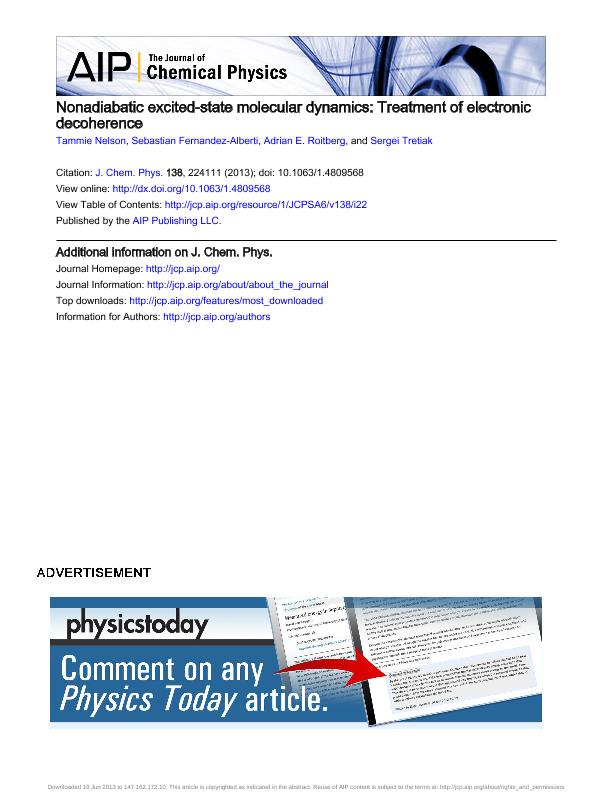Mostrar el registro sencillo del ítem
dc.contributor.author
Nelson, Tammie
dc.contributor.author
Fernández Alberti, Sebastián

dc.contributor.author
Roitberg, Adrián

dc.contributor.author
Tretiak, Sergei
dc.date.available
2017-09-20T19:01:09Z
dc.date.issued
2013-06
dc.identifier.citation
Nelson, Tammie; Fernández Alberti, Sebastián; Roitberg, Adrián; Tretiak, Sergei; Nonadiabatic excited-state molecular dynamics: treatment of electronic Decoherence; American Institute of Physics; Journal of Chemical Physics; 138; 6-2013; 224111-224124
dc.identifier.issn
0021-9606
dc.identifier.uri
http://hdl.handle.net/11336/24714
dc.description.abstract
Within the fewest switches surface hopping (FSSH) formulation, a swarm of independent trajectories is propagated and the equations of motion for the quantum coefficients are evolved coherently along each independent nuclear trajectory. That is, the phase factors, or quantum amplitudes, are retained. At a region of strong coupling, a trajectory can branch into multiple wavepackets. Directly following a hop, the two wavepackets remain in a region of nonadiabatic coupling and continue exchanging population. After these wavepackets have sufficiently separated in phase space, they should begin to evolve independently from one another, the process known as decoherence. Decoherence is not accounted for in the standard surface hopping algorithm and leads to internal inconsistency. FSSH is designed to ensure that at any time, the fraction of classical trajectories evolving on each quantum state is equal to the average quantum probability for that state. However, in many systems this internal consistency requirement is violated. Treating decoherence is an inherent problem that can be addressed by implementing some form of decoherence correction to the standard FSSH algorithm. In this study, we have implemented two forms of the instantaneous decoherence procedure where coefficients are reinitialized following hops. We also test the energy-based decoherence correction (EDC) scheme proposed by Granucci et al. and a related version where the form of the decoherence time is taken from Truhlar's Coherent Switching with Decay of Mixing method. The sensitivity of the EDC results to changes in parameters is also evaluated. The application of these computationally inexpensive ad hoc methods is demonstrated in the simulation of nonradiative relaxation in two conjugated oligomer systems, specifically poly-phenylene vinylene and poly-phenylene ethynylene. We find that methods that have been used successfully for treating small systems do not necessarily translate to large polyatomic systems and their success depends on the particular system under study.
dc.format
application/pdf
dc.language.iso
eng
dc.publisher
American Institute of Physics

dc.rights
info:eu-repo/semantics/openAccess
dc.rights.uri
https://creativecommons.org/licenses/by/2.5/ar/
dc.subject
Nonadiabatic
dc.subject
Molecular Dynamic
dc.subject.classification
Otras Ciencias Químicas

dc.subject.classification
Ciencias Químicas

dc.subject.classification
CIENCIAS NATURALES Y EXACTAS

dc.title
Nonadiabatic excited-state molecular dynamics: treatment of electronic Decoherence
dc.type
info:eu-repo/semantics/article
dc.type
info:ar-repo/semantics/artículo
dc.type
info:eu-repo/semantics/publishedVersion
dc.date.updated
2017-09-19T14:25:50Z
dc.journal.volume
138
dc.journal.pagination
224111-224124
dc.journal.pais
Estados Unidos

dc.journal.ciudad
Maryland
dc.description.fil
Fil: Nelson, Tammie. Los Alamos National Laboratory; Estados Unidos
dc.description.fil
Fil: Fernández Alberti, Sebastián. Universidad Nacional de Quilmes; Argentina. Consejo Nacional de Investigaciones Científicas y Técnicas; Argentina
dc.description.fil
Fil: Roitberg, Adrián. University of Florida; Estados Unidos
dc.description.fil
Fil: Tretiak, Sergei. Los Alamos National Laboratory; Estados Unidos
dc.journal.title
Journal of Chemical Physics

dc.relation.alternativeid
info:eu-repo/semantics/altIdentifier/url/http://aip.scitation.org/doi/10.1063/1.4809568
dc.relation.alternativeid
info:eu-repo/semantics/altIdentifier/doi/http://dx.doi.org/10.1063/1.4809568
Archivos asociados
